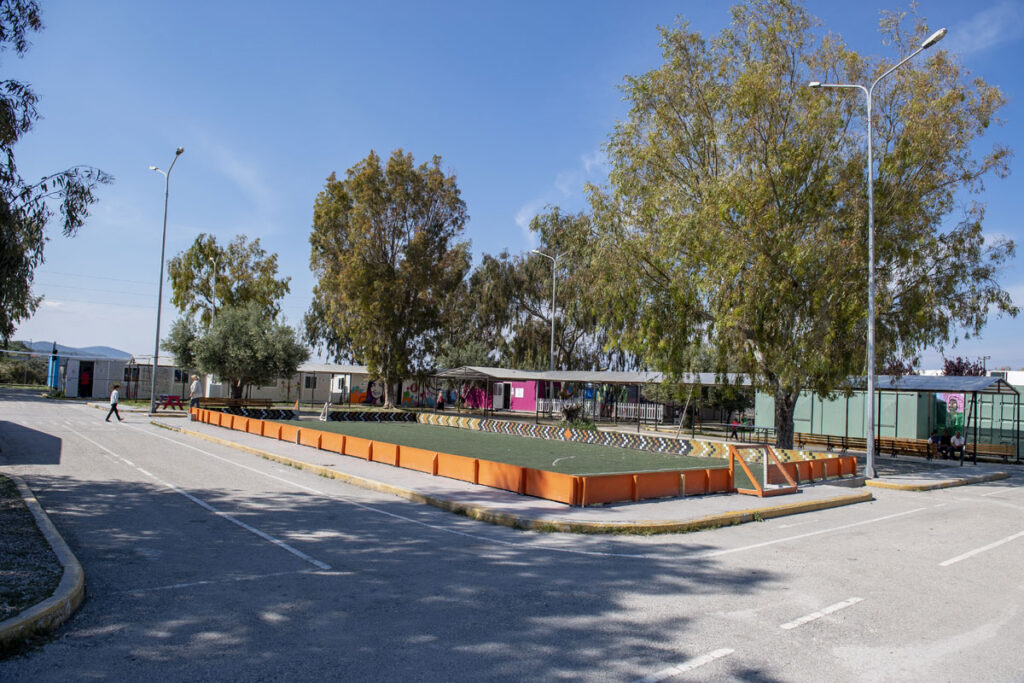By Christy Tsantioti, communications officer with Caritas Greece
Imagine you have to leave your home and family in order to save your life. Imagine you have to move away from everything you love and cherish, to make a living. Now imagine doing all that, during this deadly pandemic of COVID-19 and your new home to be an overcrowded camp.
Greece is on the frontline of migration, hosting more than 115,000 refugees and migrants, with almost 42,000 refugees stuck on the Greek Aegean islands.
The refugee crisis in the Aegean islands is at a tipping point which requires urgent action by the Greek authorities and the international community to protect the fundamental rights of refugees and migrants, such as the right to healthcare, education, and protection.
The coronavirus pandemic has permanently changed everyday life on a global scale. In this new reality, vulnerable groups such as refugees, migrants, and unaccompanied minors are particularly at risk. A potential outbreak of the virus within the extremely overcrowded refugee camps could lead to a disaster.
Where people can live in dignity
COVID-19 has intensified the already tragic conditions that migrants and refugees are facing. As countries struggle to protect their populations and economic systems the fundamental rules of refugee and human rights law are threatened.
The overcrowded reception and identification center of Moria camp, as well as the Kara Tepe camp, are now home to thousands of people and are at breaking point.
Mohammad, from Afghanistan who is now living in Kara Tepe with his wife and 3 children, lived in Turkey for a couple of years. He was fortunately transferred from Moria a couple of weeks before the onset of COVID-19.
‘’In Kara Tepe, we feel safe. We are glad we don’t live in Moria anymore, especially now,” says Mohammad. “In some ways, not much has changed for us. In Turkey, where we lived for 4 years, I was the only one going out for work. My wife was sick and couldn’t leave the house and generally, everybody felt safer to stay indoors. Additionally, we feel much better being moved from Moria, where we stayed for 3 months. We don’t have to worry about the long queues for the food, the fights, living in a tent, and worrying about our health. We are calmer and no longer afraid.’’

Kara Tepe camp in Lesbos. Photo by Bente Stackowkse/Caritas Germany
Kara Tepe, which is just a few kilometers from Moria, has been hailed as an exemplary site for housing refugee families. It is a humane camp where people can live in dignity. Around 1,300 people identified as “vulnerable” in Moria found a temporary home in Kara Tepe, including people with disabilities, families with young children and pregnant women.
Leave no one behind
Caritas Hellas continues its mission in this challenging new reality and believes that no one should be left behind. We raise awareness on the issues around migration and we provide assistance to those who find themselves dealing with the coronavirus under difficult circumstances, particularly marginalized groups.
Caritas Hellas has been providing people on Chios and Lesbos islands with cleaning items such as soaps, antiseptics, rubbish bags and also infant powder milk.

English and Greek language lessons in Caritas language Centre in Kara Tepe accommodation site has restarted. Photo by Caritas Hellas
In addition, psychosocial services are now offered remotely due to restrictions to stop the spread of the virus. Through web conferencing and phone, psychological support for the residents of Kara Tepe has continued and has been expanded to include residents of Moria camp as well as to the Greek population residing in the North Aegean islands.
‘’Being listened to means a lot for us. It is a great gift,’’ says Mohammad.
Furthermore, Caritas Hellas and Caritas Athens, in partnership with Catholic Relief Services, a US member of the Caritas confederation, participate in the UNHCR-led ESTIA Accommodation Programme which contributes significantly to decreasing the number of people who are staying at the refugee camps on the islands.
The ESTIA program hosts 26.000 asylum seekers across Greece and provides dignified and safe accommodation, plus economic support. Caritas Hellas and Caritas Athens provide the aforementioned services to approximately 2,500 asylum seekers in Athens and Thessaloniki.
The core principles of refugee protection are being put to test nowadays. But we are going to continue to be on the side of the vulnerable such as those living in Kara Tepe camp.
We are all in this together. Caritas Hellas is going to continue its efforts, aiming to leave no one behind.



